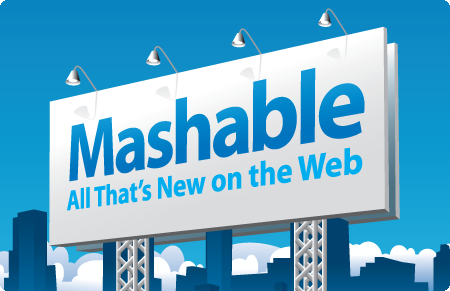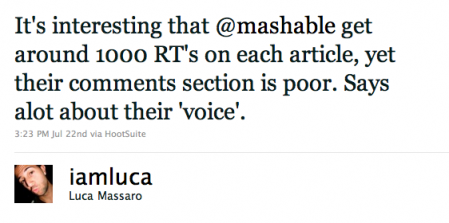
All posts tagged Business


Sacrificing Security to Build the Legacy
Being offered a dream opportunity can definitely sway your direction. Not being able to fulfill that dream can definitely test your character. Here I tell the next chapter in my story. Continue Reading

Are Mashable Spreading Themselves Thin?
Mashable; ‘The Social Media Guide’, the monstrous mash-up blog that opened up the world of Social Media at the helm of Scottish born Pete Cashmore. The site quickly became the leading new media website in the world due to it being the most comprehensive and active Social Media News site of recent years.
As it has expanded in size, recruiting more and more writers from different journalistic backgrounds, it has made a transition into wider areas of Digital Technology where the competition is greater and the audience is larger.
Formally known as ‘The Social Media Guide’… Now that the slogan is no longer present on the site, what kind of site are Mashable now?
The Opportunity
Cashmore can see the opportunity with the amount of press and traffic his site receives daily. Therefore, maybe it should be leaping into reporting on all things digital/technical.
But could this transition be more of an innovative move by Cashmore; knowing that Social Media is losing the ‘what is social media’ factor that made his baby ever so popular in the first place?
Facebook recently achieved a landmark milestone in digital history, by reaching 500 million users. Funny, considering it was only a year ago that we were still trying to prove that Social Media wasn’t a fad.
The Transition
Mashable’s new 2010 re-design has dropped the tagline ‘The Social Media Guide’ and opened up it’s news wings to expand into all areas of digital technology.
It had been reporting on most new technology news since launch but had always put a social media spin on it.
Only recently, has it decided to devote a large portion of it’s articles to technology without the social fluff.
With all businesses, as you expand into other areas, you face more and more competition. Where you may dominate your specific niche (in this case Social Media); if you decide to focus on multiple areas, such as Web Technology, Mobile and Business for example, you will find yourself not only taking away the USP of your site, but also confusing your core market (which in this case im not too sure what that is for Mashable).
The Stats Never Lie
I tweeted about this exact topic recently and the response i received was interesting. A few replies highlighted that while the engagement on Mashable is low in comparison with their ‘share factor’, the point was raised that most people would rather share an article and discuss with their own network than comment directly within the article itself.
I guess that makes sense, and no-one can argue with their analytics, as it’s plain to see that Mashable receive some pretty dominating numbers.
However, as the place to visit for all new media information, wouldn’t you expect at least 0.01% of their 3 million daily page views to translate into more than their average of 16 comments per post?
Each of Mashable’s articles receive the best part of 1000 Twitter Retweets and the Facebook share’s are somewhat lower. For every 1000+ shares, we see an average of 16 comments, which to me indicates, that while we love to recycle content and share knowledge with our networks (for whatever ego boosting illusion of intelligence we want to create), as ‘Social Medium’s’, we chose to not pay much attention to the source.
Sharing Doesn’t Always Mean Caring
I’d love to investigate into this further and really challenge the concept of sharing articles and how does it really coincide with the definitive definitions of Social Media (if there is a definitive) or at least acknowledge that sharing doesn’t always go hand in hand with ‘engagement and interaction’.
If the King Kong site of Social Media is happy to knock out relentless articles daily and keep it’s followers sharing the content, but not directly engaging; in my opinion (and that’s all this is) Mashable is losing a severe amount of brand equity, as the amount of time their average reader actually spends on the site would be minimal.
The Reality
Mashable is a force, that is obvious. It’s writers know their stuff and while some of their articles are completely pointless the majority are informative and relevant.
But ask yourself this; when you visit Mashable what do you expect to find?
I can’t speak for anyone else, but do we really want to visit Mashable and see the same iPhone article that can be found on Tech Crunch, Engadget or Gizmodo?
Do we want to find Money and Finance information that we could see more comprehensively on Money Saving Expert? Do we want to watch the latest movie trailers in their Entertainment section?
Mashable is the site that made Social Media easy for people to understand and keep track of as it grew and grew.
Personally, while it’s great to be ‘that one site’ that tries to report on EVERYTHING going on in new media, at the same time, there is a huge area of confusion for the consumer.
Pete Cashmore explains in his interviews that Mashable started as a ‘mash-up’ of content on the Internet. Yet it’s tagline was Social Media and it became famous for being the Social Media Guide, not for being a source of all things digital.
I doubt Mashable will care whether it’s network interact on their website or share the content without thinking. As a business they are successful and no doubt their traffic brings ridiculous revenue; but it’s only a matter of time before the masses realise Mashable’s content isn’t as revolutionary as it used to be and people will get bored of retweeting the same recycled content.
Note:
If you are one of the thousands of people that Retweet Mashable’s article’s but don’t have an opinion.
Please stop. The whole world of Twitter is following Mashable and we all see their feed.
At least be creative and voice an opinion for sharing.


